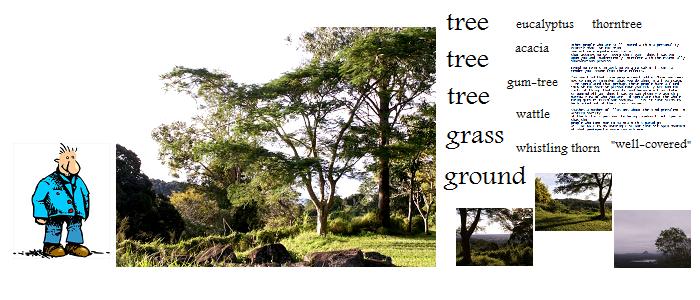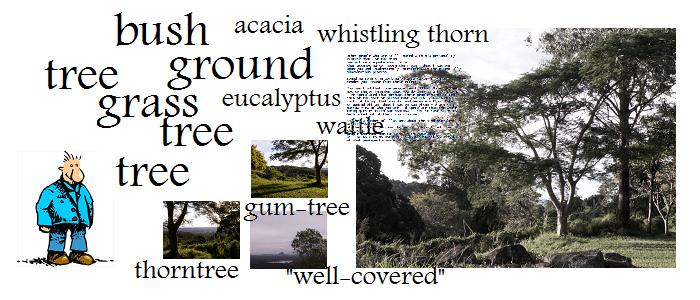This is a basic overview of one of the 'problems' that our society encounters in its current use of language.
... So what is 'perception' all about?
For starters we get sensory data from the world around us.
Mainly we see, hear and feel things.
Then behind this we have verbal labels of things, 'Tree', 'Ground', 'Sky' and
whatever.
These verbal labels can be pretty handy; they let us communicate
basic information about our surroundings quickly and efficiently,
help us to organise intellectual knowledge about things
and allow us to more quickly recognise separate objects and things.
We would probably also have various memories of similar events and situations coming to mind. Verbal labels also come from 'memory' so they are related.
Here's a picture to illustrate 'perception'...
... where we see our clip-art man out for a walk in the countryside, and the
verbal labels and memories that are evoked by this scene.

Seems fairly straightforward, in fact you're probably thinking
'Yeah, that's what we're doing now - isn't it?'
The problem is, the answer to that question is probably No.
For sure that is how perception works for children but, in our society at least,
it doesn't stay that way for long.
We are taught to be faster and faster at 'recognising' things - to be faster
at jumping straight to the verbal label - "Yes that's the correct answer, how clever you are, a Gold Star for you."
There's likely to have been very little - if any - attempt to redress this imbalance,
and like anything repeated enough it will eventually become a habitual, ingrained method of perceiving the world.
After many, many years of this 'pro-verbal' conditioning we end up with
'perception' looking a bit more like this:

Now our 'clip-art person', when looking at the world, immediately
jumps straight to the verbal label. Things are 'recognised' - and no further
mental enquiry is necessary.
Memories of similar events also come to the fore.
So what are some of the consequences of this type of perception?
- The world, now that it is not being looked at as closely,
may look increasingly dimmer and blander. Very old memories
from times before verbalising took over (e.g. Childhood)
may appear 'brighter' and more intense in comparison.
- The world, and life, seems boring.
The 'solution' being an endless search for distractions -
gadgets with more whizzy functions, films with louder explosions,
TV shows with more spectacular glitz, fairground rides with bigger loops and so on.
Soon the novelty gets assimilated and the search goes on for the
next new big distraction.
- There is a tendency to react to the old memories that are being evoked
by the situation - rather than reacting to the actual physical reality.
This could manifest as 'making the same mistakes again and again' and / or
by acting in ways that are totally inappropriate.
- Similarly there can be a tendency to act as though the words in
our head have more reality than the actual Universe, with the same
result of decisions and actions being based on something other than the real world.
- People who have learnt how to play around with words gain
an unparalleled ability to manipulate other people's beliefs and actions.
Is it a co-incidence that people with supposed 'magical powers' were also
referred to as being 'wise with words'?
- Strategies of Creativity such as 'brainstorming' that rely on a
period of time 'playing around' with apparently 'daft' ideas
are profoundly difficult for this mindset that just wants to label these initial ideas
as 'rubbish' - an act which halts the creative process.
Arguably any mind that is heavily memory-dominated will have extreme difficulty
coming up with a truly 'new' idea anyway - because anything from a memory is not
really that new!
All of this happens automatically, habitually and would seem totally natural
and normal to the person involved.
It's quite possible that some people have a kind of instinct that something is 'missing' or 'not right' with their lives (like a 'splinter in their mind' maybe...)
However, the quality of information available
about this subject is currently so poor
that such 'seekers' become easy prey for huksters and charlatans.
But now the 800 Trillion Dollar Question:
So what do we do about it?
In theory it's very straightforward all you need to do is -
- Firstly avoid the temptation to satisfy yourself with 'understanding' this
information and then giving a lecture on how enlightened you are...
You need to do it, to take action.
- Whenever possible take the opportunity to stop the internal mental chatter
and spend some time being aware of the sensory data coming in from the world.
Run your hand across the bark of a tree or the stones of a wall -
and focus on the actual feelings, not verbal descriptions / labels.
- Re-train your mind to keep looking at objects even when they
have been 'recognised', even after you 'know' what the object 'really is'.
Keep looking, keep trying to discern - to perceive - deeper and deeper levels
of the complexity of this thing. What is unique about this sunset?
How is this flower different from this one? Pretend you are seeing these things
for the first time. What are the unique qualities of these objects?
Ask your mind these questions! And keep looking and searching for more uniqueness.
I would recommend practising this at least one hour every day at first.
... in practise you might find that rewriting decades of
social conditioning requires a bit of tenacity and determination,
but I am confident that you can learn to be a Zen Master in no time.
There are a few books that may be useful to you.
Creative Intelligence by Ted Falconar
The best book about the link between
Zen, language, creativity, mysticism and Albert Einstein
that I have ever read.
Drawing on the Right Side of the Brain by Betty Edwards
A course in how to develop your 'sketching' skills through the cultivation
of a non-verbal state of mind.
Or alternatively a course in how to cultivate a non-verbal state of mind
through the development of your 'sketching' skills...
And finally, if you are one of those people who have Firefly on DVD and haven't
yet listened to Joss Whedon's commentary for the 'Objects in Space' episode
then do so. Amongst the usual casting / directing / filming anecdotes
there are some comments about the distinction between physical objects
and the mental labels we assign to them
that may give you another angle on this subject. Or it may not.
The illustrative graphics have used:
Forest
landscape pictures by FreeNaturePictures.com
'Man' image from
Free Clip-Art Now